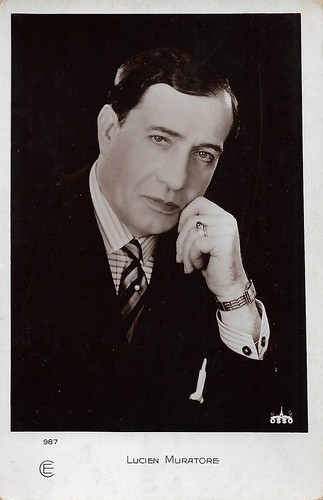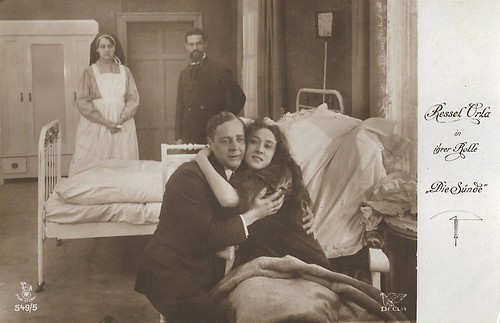French actor, dramatist and director Sacha Guitry (1885-1957) was known for his stage performances, often in the more than 120 plays he wrote. Guitry's plays range from historical dramas to contemporary light comedies. From the 1930s to the end of his life, he enthusiastically embraced the cinema, making as many as five films in a single year. After his death, 12,000 people filed past his coffin before his burial in Paris.
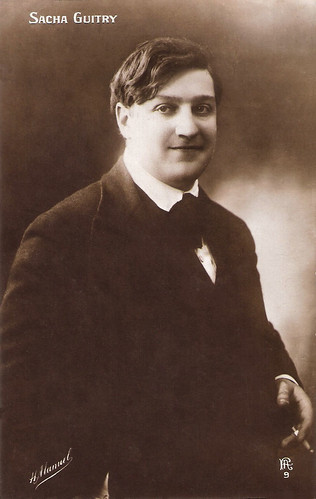
French postcard by F.A., no. 9. Photo: H. Manuel.

French postcard by Editions P.I., Paris, no. 84. Photo: Studio Piaz.

French postcard by GREFF, S.E.R.P. Editeur, Paris. Photo: Studio Harcourt.
His own definitive interpreter
Alexandre-Pierre Georges ‘Sacha’ Guitry was born at Nevsky Prospect no. 12, Saint Petersburg, Russia, in 1885. He was the third son of the French actor
Lucien Guitry and his wife
Marie-Louise-Renée, née Delmas de Pont-Jest. The couple had eloped, in the face of family disapproval, and were married at St Martin in the Fields, London, in 1882. They then moved to the Russian capital, where Lucien ran the French theatre company, the Théâtre Michel, from 1882 to 1891.
The marriage was brief. Guitry Senior was a persistent adulterer, and his wife instituted divorce proceedings in 1888. Two of their sons died in infancy (one in 1883 and the other in 1887); the other surviving son,
Jean, became an actor and journalist. The family's Russian nurse habitually shortened Alexandre-Pierre's name to the Russian diminutive ‘Sacha’, by which he was known all his life.
The young Sacha made his stage debut in his father's company at the age of five. When
Lucien Guitry returned to Paris, he lived in a flat in a prestigious spot, overlooking the Place Vendôme and the Rue de la Paix. The young Sacha lived there, and for his schooling, he was first sent to the well-known Lycée Janson de Sailly in the fashionable Sixteenth arrondissement. He did not stay long there and went to a succession of other schools, both secular and religious, before abandoning formal education at the age of sixteen.
After giving up school, Guitry embarked on a career as a playwright with a little musical piece called 'Le Page' (1902), with a score by
Ludo Ratz. Eighteen months later, he joined his father's company at the Théâtre de la Renaissance. At first, he appeared under the stage name ‘Lorcey’, but the pseudonym deceived no one, as the press immediately announced the debutant's real identity. His first role was in 'L'Escalier', by
Maurice Donnay, in November 1904.
He fell out with his father over what the latter saw as Guitry's lack of professionalism. In the aftermath of their quarrel, they neither saw nor spoke to one another. A member of
Lucien Guitry's company was a young actress,
Charlotte Lysès. In 1905, she and Sacha set up home together. For her, he wrote his play, 'Le KWTZ' (1905).
He had his first substantial hit with 'Nono' at the Mathurins. When the leading man in Guitry's 1906 play 'Chez les Zoaques' fell ill, the author took over, and in the words of a critic, "proved to be his own definitive interpreter". The pattern of his career was set: he remained an actor-author and later manager for the rest of his life.

French postcard by Editions Gendre, Paris, no. 119. Photo: Paul Nadar, 1905. Caption:
Sacha Guitry, French actor and author, 1885-1957.
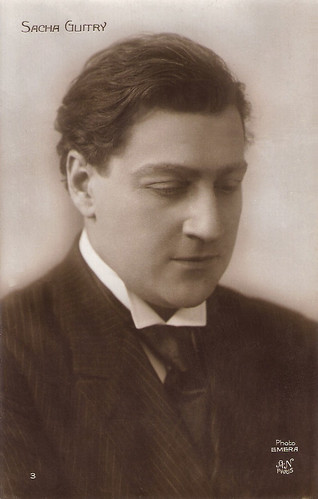
French postcard by A.N., Paris, no. 3. Photo: Emera.

French postcard by La Voix de son Maître. Photo: Alban, Bruxelles.

French postcard by Editions Chantal, no. 505. Photo: Tobis.
Five consecutive hits
For the next five years,
Sacha Guitry's plays were, at best, moderate successes. But then he had five consecutive hits with 'Le veilleur de nuit' (1911), 'Un beau mariage' (1912), 'Le prise de Berg-op-Zoom'
(1912), 'La pèlerine écossaise' (1912), and 'Les deux converts' (1914), the last of which was staged by the Comédie Française. His first film was
Ceux de chez nous / Those Of Our Home (Sacha Guitry, 1915), a short patriotic piece illustrating the works of some French artists like
Auguste Renoir,
Auguste Rodin and
Sarah Bernhardt. He wrote and played in the film
Un Roman d'amour et d'aventures / A Novel Of Love And Adventure (René Hervil, Louis Mercanton, 1917), an experience that left him unsatisfied. He was not greatly attracted by the medium of silent film, regarding dialogue as the essence of drama. So, he did not make a full-length film until 1935.
In 1915, he met the young singer
Yvonne Printemps, with whom he began an affair that led Charlotte to leave him and obtain a divorce. Guitry started to write leading roles for Printemps in some musicals and straight comedies. Guitry was reconciled with his father in 1918. Lucien appeared in many productions with his son and Printemps, including 'Mon Père avait raison' and 'Comment on ecrit l'histoire'. They played together in Paris, but also in the West End of London.
Guitry developed a charming, witty stage persona, often appearing in period-dress light comedies, for instance, his 1925 pastiche 'Mozart', about the young
Wolfgang Amadeus Mozart on a visit to Paris. To compose the score, he approached
André Messager, with whom he had successfully collaborated in 1923 on a show for Printemps, 'L'amour masqué'. Messager was unavailable and recommended the composer
Reynaldo Hahn, who accepted the commission. The resulting production took some liberties with historical accuracy, but it proved highly popular. Printemps, in a breeches role, played and sang the young Mozart, with Guitry as the composer's patron, Baron Grimm. After playing successfully at the Théâtre Edouard VII, the company presented the piece in London, on Broadway, Boston and Montreal in 1926-1927.
In 1931 Guitry was awarded the Legion of Honour. In 1932, his marriage to Printemps ended. He took a six-month break from the theatre, returning in April 1933 in 'Châteaux en Espagne', which co-starred his new protégée,
Jacqueline Delubac, whom he married on his fiftieth birthday. In 1935, he returned to the film studio to direct and act in
Pasteur, a biography of the famous scientist. The film, based on a play which Guitry wrote in 1919, was a commercial failure, but during the shooting, Guitry fell in love with the process of filmmaking. He followed
Pasteur with
Bonne chance (Sacha Guitry, 1936), a comedy written directly for the screen.
In 1936 alone, Guitry released no less than four films, including the screen versions of two of his best-known plays:
Faisons un rêve (written in 1916) and
Mon Père avait raison (written in 1919).
Le Roman d'un tricheur / The Story of a Cheat (Sacha Guitry, 1936) was adapted from Guitry's only novel, 'Les Mémoires d'un tricheur', published in 1935. Despite lukewarm reviews, the film was well-received by the public and was also successful abroad. It is now considered his most innovative film. Apart from the four films, Guitry also wrote five plays in 1936. The following year, he played four roles in the partially historical film
Les perles de la couronne / The Pearls Of The Crown (Sacha Guitry, Christian-Jacque, 1937) about the history of seven pearls, four of which ended up on the crown of England, the other three end up missing. In 1939,
Jacqueline Delubac left her ‘workaholic’ husband. Within months of her leaving him, he married for a fourth time; his new wife was actress
Geneviève de Séréville.
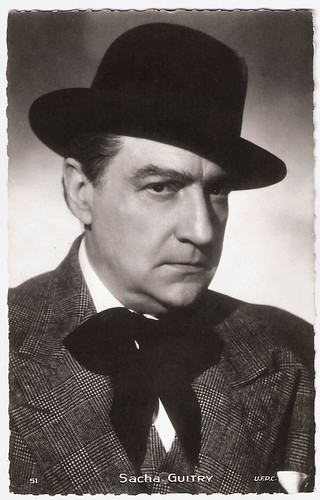
French postcard by Editions E.C., Paris, no. 51. Photo: U.F.P.C.
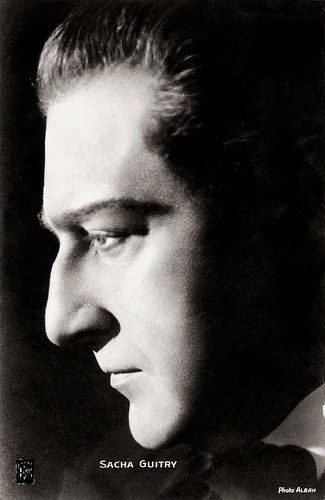
French postcard by Editions et Publications Cinematographiques (EPC), no. 144. Photo: Alban.

French postcard by Editions P.I., Paris, no. 84.

French postcard, no. 710. Photo: Film Sédif.
Accusations of collaborating with the enemy
Sacha Guitry's career was affected by the Nazi occupation of France. He continued to work both on stage and in the cinema under the Nazis. Although this allowed him to help many of his compatriots, it also brought accusations of collaborating with the enemy. He conceived his book and associated film,
De 1429 à 1942 ou De Jeanne d'Arc à Philippe Pétain / 1429 to 1942, or Joan of Arc to Philippe Pétain (1942) as a tribute to France's past glories, but many saw it as honouring the collaborationist president of Vichy France, Marshal Pétain.
In 1944, Guitry's fourth wife left him. On the liberation of France, Guitry was among the first arrested by a self-appointed militia. He was interned in a detention camp at Drancy and suffered ill effects on his health that necessitated his transfer to a Paris nursing home. He was completely cleared of all accusations of collaboration, but the experience left him disillusioned.
In 1947, Guitry married for the fifth and last time; he was sixty-two and his bride,
Lana Marconi, was twenty-eight. He was permitted to resume working in the theatre in 1948 when he returned to the Paris stage with 'Le diable boiteux'. For the London season in 1953, celebrating the coronation of Elizabeth II, Guitry starred at the Winter Garden in 'Ecoutez bien, messieurs', a comedy in which he played a voluble Frenchman reduced to baffled silence by an even more voluble Englishwoman, played (in English) by
Heather Thatcher. Later in the same year, he made his last stage appearance in Paris in 'Palsambleu'.
A huge success in the cinema was the historical drama
Si Versailles m'était conté / Royal Affairs in Versailles (Sacha Guitry, 1954), which tells some episodes through the portrayal of the personalities who lived in Versailles' castle. In the film appeared a great number of well-known French actors appeared, often in short parts. Guitry also made the ‘sister’ films
Napoléon (Sacha Guitry, 1955) with
Daniel Gélin as Napoléon as a young man and
Raymond Pellegrin as Napoléon in later life, and
Si Paris nous était conté / If Paris Were Told to Us (Sacha Guitry, 1956).
He continued to make films until 1957, when he suffered a disabling disease of the nervous system.
Sacha Guitry died in Paris at the age of seventy-two. Twelve thousand people filed past his coffin, and he was buried, like his father, in the Cimetière de Montmartre, Paris.

French postcard. Set of the play 'La Fin du Monde' by Sacha Guitry, first performed in 1935, at the Theatre de la Madeleine in Paris. Not to be confused with the 1930 Sci-Fi film by Abel Gance.
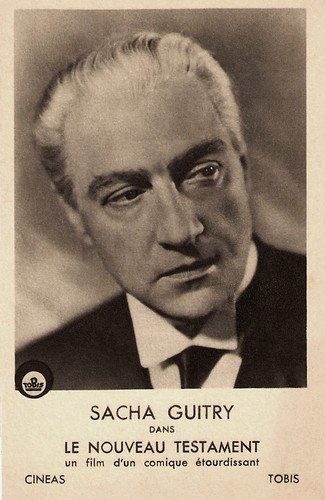
French promotion card by Cineas. Photo: Tobis. Publicity still for
Le nouveau Testament / Indiscretions (Sacha Guitry, 1936).

West-German postcard by Universum-Film A.G. (Ufa), Berlin Tempelhof, no. FK 955. Photo: C.L.M. Film, Paris/ Pallas Film Verleih.
Lana Marconi in
Si Versailles m’était conté / Royal Affairs in Versailles (Sacha Guitry, 1954). Collection: Marlene Pilaete.

French postcard by A.N., Paris, no. 1088. Photo: Raymond Voinquel.
Sources:
François Leclair (IMDb),
Wikipedia, and
IMDb.





